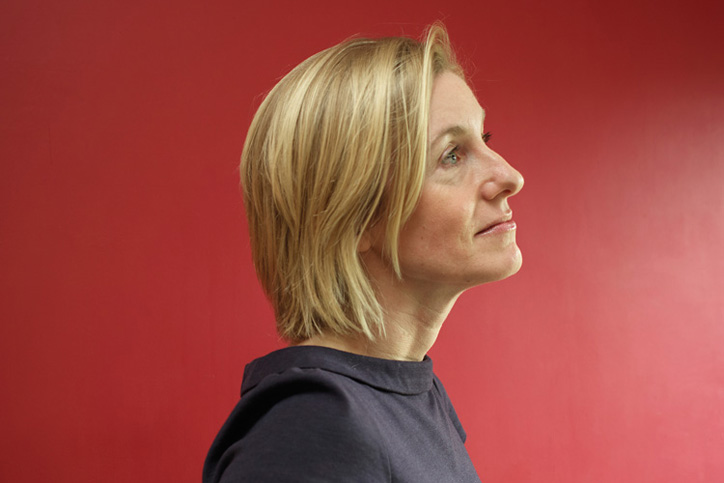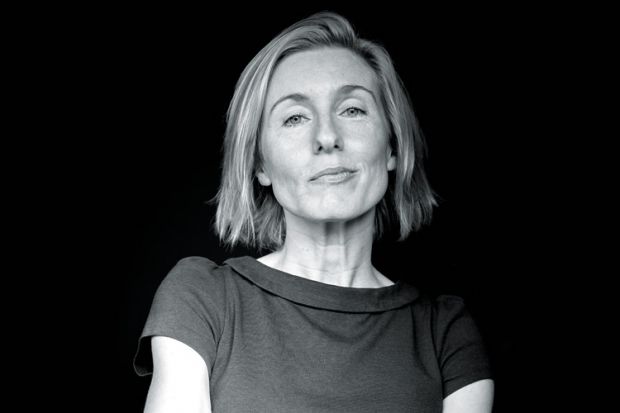In the mid-1990s, Joanna Williams embarked on an English degree “as a very naive 19-year-old” who liked reading.
By the end of the first year, she’d decided that she hated the course. It turned out to be about “feminism, historicism, postmodernism, Marxism, structuralism and poststructuralism”. Williams and her peers were asked, for example, “to interpret Jane Eyre from a feminist perspective. ‘Oh look, he’s standing by the chimney, that’s a phallic symbol!’ It was very much on that rigid level: every man is bad, dominating, representative of the patriarchy; every long, tall object is a phallic symbol. We were pushed into thinking about these works in a particular way.” Not only did this kind of ideological analysis seem all too easy, it also left her “feeling kind of cheap”.
The impact of this experience can still be seen in Williams’ new book, Academic Freedom in an Age of Conformity: Confronting the Fear of Knowledge, which includes a good deal about how both critical theory and feminism have had a negative impact on teaching and research.
The influence of critical theory, she believes, lies behind another immediate inspiration for Academic Freedom: the response to her 2012 book, Consuming Higher Education: Why Learning Can’t Be Bought. Her attacks on the notion of student as consumer provoked widespread agreement among her academic peers. What Williams found “shocking”, however, was “the response to the part of the book I thought least controversial: that…the role of the academic is to pursue and transmit a body of knowledge. People were horrified by that and I was quite taken aback.” Critics seemed to object to the implication that there was such a thing as objective knowledge, as opposed to conflicting discourses.
The publication of Academic Freedom coincides with the decision taken by Williams – programme director for the MA in higher education at the University of Kent – to cut back her university workload to just one day a week. This is partly because “the bureaucracy associated with being part of any institution eats up significant amounts of time”, detracting from her ambition to “engage non‑academic audiences in a public discussion of ideas through blogs and journalism…and not in the format strictly demanded by the research excellence framework”.
Yet her disillusion with academic life also goes deeper. “There is currently a great deal of talk – panic even – about censorious students,” she explains, referring to incidents such as a push from Cardiff University students to ban Germaine Greer from speaking at the university on account of her view that transgender women are not real women.
“Some people of an older generation are looking on in horror and wondering where these students have come from,” she says. Yet although Williams deplores the desire of some students to be protected from ideas they find uncomfortable, she believes this trend is “a product of today’s universities”, in which “academics and administrators accommodate student demands”.
“Students are encouraged to see themselves as vulnerable,” she says. “Humanities students are encouraged to see reality as constructed through discourse. They are taught that words are all-important in producing the conditions of oppression. The same academics who flatter and encourage student censors are reluctant to engage in intellectual challenge from fellow academics. Dissenting views are ignored, or relativised as ‘just an alternative standpoint’…So these same trends that produce student censors keep intellectual dissent off campus – and this is why I don’t really think there is any long-term future for someone like me within academia. I enjoy controversy!”
Although it ranges widely across the past century or so of higher education, Academic Freedom is largely concerned with justifying these central claims. One of the key shifts the book sets out to track, Williams says, is “where the threats to academic freedom have come from”. As Darwinism gradually gained support among academics in the late 19th century, she writes, it “became a focal point for conflict between academics and institutional benefactors [often with religious affiliations or commitments]…Through privileging scientific knowledge over religious belief, academics were demanding the right to challenge existing understandings of the world and to propose an alternative, superior truth.” Most were working within “powerful, truth-seeking [disciplinary] communities of practice, with a shared commitment to knowledge”. A classic statement of this emerging demand for academic freedom was the newly established American Association of University Professors’ 1915 Declaration of Principles of Academic Freedom and Academic Tenure.
As the decades have rolled on, however, there has been a retreat from such ideals. Where once “censorship and calls for conformity (seen most explicitly in McCarthyism) came from the [political] Right and [from] outside the academy”, Williams tells me, they are now “coming more from the Left and intellectual radicals and [from] inside the academy”. This has led to universities becoming (as her book puts it) “dominated by consensus and conformity”, with many academics “reluctant…to say anything controversial at all”.
Not everyone will agree that such a claim holds up to scrutiny. Whatever one thinks of queer theory or academic debates about BDSM (bondage, dominance, submission and sadomasochism), for example, it is hard to see them as bland received wisdom that everybody agrees with. But Academic Freedom points to “new moral orthodoxies…on a range of issues, such as protecting the environment, gender equality, the dangers of [a loosely defined] neo-liberalism and the need to promote cultural diversity”. Such views, Williams thinks, have a tendency to become unassailable pieties.

“I am not a climate-change denier, but I think it should be discussed and not placed beyond discussion – and I certainly don’t think that the response we have as a society is beyond discussion,” she says. “Sustainability is one solution, but there might also be more technological solutions. But, within higher education, sustainability has become a major topic and is taught as a moral value. You assess ‘Are your students demonstrating sustainability?’ rather than ‘Is sustainability the only response?’…You can see even in the titles of some courses that sustainability is the answer…As soon as you present something as a value and assess students on that value, you are putting things beyond debate.”
A related development, which Williams partly attributes to feminism and other forms of identity politics, is a trend for students to be encouraged to reflect on their own experience. “What people are being taught is that their subjective experience is…more important than any kind of ‘fact’ of the situation…[Feelings] are the one thing that can’t be challenged or questioned, because they are completely subjective,” she says.
Although acknowledging that groupthink exists in other sectors of the economy, Williams believes that it is more significant in the case of academia, since “the business of universities is knowledge, so if you put ideas beyond discussion and create conformity, it’s more damaging”.
It is often argued that higher education has a civilising effect on students, making them more tolerant of migrants, for instance. But, even here, Williams begs to differ: “What academics mean by that is that ‘students come in here as Sun readers and we send them out as Guardian readers’. Therefore, we’ve made them more tolerant, because we’ve eliminated that nasty Sun-reading habit and inculcated that nice Guardian-reading habit instead. But that doesn’t necessarily make them more tolerant – they may be very intolerant of Sun readers, for example.”
One possible counter to the malaise of relativism and lack of intellectual rigour on campus, according to Williams, is disciplinary norms. She admits, uncharacteristically, to having “love-hate feelings” about disciplines, noting that they can play an “excluding role” by directing attention to certain kinds of questions and answers: a tendency that is only intensified by the pressure imposed by the REF to publish in a narrower range of journals than previously. But she also argues that disciplines “allow for the advance of knowledge” by creating “the marketplace of ideas. Having a shared knowledge base, methodological approaches [and] theoretical frameworks allows knowledge to advance.” Her book therefore calls for “a guarded defence of disciplines” – albeit not one that is “based upon nostalgia, or…marking out academic territory”.
As with any book unequivocally committed to free speech, Williams’ inevitably raises questions about the extreme cases. British and US universities aspire to be tolerant and inclusive – and surely are inclusive by most historical standards. No one would (presumably) want gatekeepers standing outside a public meeting on campus checking people’s sexual orientation or ethnic background, or whether women are menstruating, before letting them in. But if that is so, should universities nonetheless allow speakers at public events to argue that gays are undermining society, blacks are dangerous savages or that menstruating women are unclean?
“Though it would be putting it far too strongly to say I welcomed it,” responds Williams, “I wouldn’t oppose someone speaking in a university saying something derogatory or horrible, and which I disagree with in every bone of my body, because it gives others an opportunity to challenge, take up or oppose them.”
The same, she says, applies to “inflammatory speakers” who might fall foul of the government’s Prevent strategy, which aims to ensure that students do not become radicalised by Islamic extremists.
“Of course universities must operate within the law. My concern is that they often over-interpret the law, so there is less free speech on a university campus than there is in society at large,” she says.
Muzzling speakers is also an ineffective remedy to their ideology, Williams believes: “If you ban speakers from coming on to a university campus, they are not going to go away. They will find a way to speak anyway. The battle of ideas is never won because you can’t bury bad ideas: you can’t wish them out of existence. All you succeed in doing, if you ban transphobic or Islamic fundamentalist arguments, is driving them underground. And there’s a real danger if you [do so] you make them more attractive…As the mother of a 17-year-old, I know that anything forbidden immediately has an allure attached to it. Having [the discussion] on a university campus means precisely that people are there to argue against these ideas and present another view, either within the context of a particular meeting – which would definitely be my preference – or elsewhere on the university premises at the same time.”
To support this argument, Williams cites the well-known example of how the former British National Party chairman Nick Griffin only discredited himself by appearing on Question Time. Yet she also believes that it is “important to say to people who are black or gay: ‘We don’t think you are too weak to cope [with racist or homophobic speakers], we’re not going to patronise you: we think you are equal and can cope’…I think, in reality, students are far more robust than they are given credit for. They can hear speakers without either swooning or converting.”
At the end of Academic Freedom, Williams concludes that “rejecting the liberal project of advancing knowledge through competing truth claims has left universities without a purpose”. While some have tried to fill the gap with “employability skills” (as she described and rejected in her earlier book), others focus on a seemingly “more appealing promotion of inclusive values”. Yet, for all their obvious differences, both “demand that students demonstrate obedience, rather than critical thinking”.
Williams will no doubt continue to make a case for what she sees as the true purpose of the university – although now largely from the outside, rather than from within.
Joanna Williams’ new book, Academic Freedom in an Age of Conformity: Confronting the Fear of Knowledge, is published this week by Palgrave Macmillan.
Register to continue
Why register?
- Registration is free and only takes a moment
- Once registered, you can read 3 articles a month
- Sign up for our newsletter
Subscribe
Or subscribe for unlimited access to:
- Unlimited access to news, views, insights & reviews
- Digital editions
- Digital access to THE’s university and college rankings analysis
Already registered or a current subscriber?




